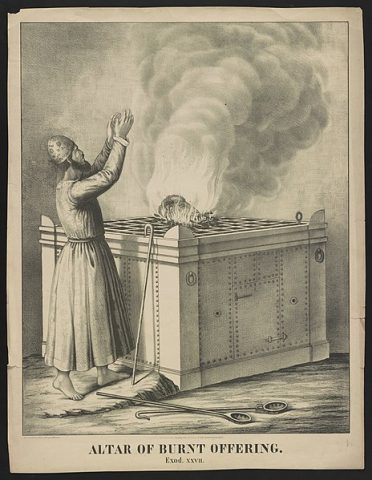In Troubled Times, A Priest Must Pray and Conform His Heart to God

Jay Scott Newman: The End of the Imperial Episcopate
August 22, 2018
Michael Pakaluk: Capital Punishment and the Sex Abuse Crisis
August 22, 2018
By Msgr. Charles Pope, August 21, 2018
In times like these when Church reform is so urgent, priests must refocus and re-center their lives more clearly than ever. Through prayer and study every priest must guard his heart and, in so doing be more empowered to help God’s people do the same.
Two images come to mind, one of prayer and the other of study, but both of them summon the priest to guard his heart and center his mind on God and what God teaches.
The first image is from the Book of Leviticus:
The fire on the altar shall be kept burning; it must not go out. Every morning the priest is to add wood to the fire, arrange the burnt offering on it, and burn the fat portions of the peace offerings on it. The fire must be kept burning on the altar continually; it must not go out, it must not go out! (Leviticus 6:12-13)
The fire referred to here is the fire on the altar before the ancient Temple, or Tent of Meeting. But for our purposes, it is an image of prayer. The prayer of the priest for himself and his people is a fire that must never go out. Prayer, as a conversation with God, is a conversation that must not end. Every morning the priest is to add wood to this fire of prayer; he is to offer a sacrifice of praise, and beg God on behalf of God’s people.
As priests, we are directed to pray the Liturgy of the Hours, sometimes called the “breviary,” or “office.” We are also called to spend time before God in quiet prayer and attentiveness, so that, hearing what God says, we can then offer his teaching to the faithful.
The text here is emphatic: this fire (of prayer) must not go out; it must not go out. It must never be extinguished. A priest who stops praying is dangerous to himself and others.
Encourage your priests to pray. Say: “Father I am counting on your prayers for me!” Be specific too as a gentle reminder to him. “Father, when you pray the office, please remember me!” “Father, in your Holy Hour and visits to the Blessed Sacrament, please remember my family!” In so doing you, remind him of his obligation to pray and that you presume he is doing so.
Priests must pray! This is a fire that must never be extinguished.
The second image is one of prayerful study and careful teaching.
In his treatise, The Book of the Pastoral Rule, Pope Saint Gregory the Great applies details from the Old Testament priesthood to the priests of the New Covenant. In one reflection, he remarks on the details of the breastplate of the high priest and what they signify.
In effect, Pope Gregory instructs the priest to guard his heart, keeping it safe from the poison of false doctrine and misplaced affections, wherein he fears man more than God and desires affection and approval more than speaking the truth. In one section he writes:
Thus, it was assigned by the divine Voice that on the breast of Aaron, the vestment of judgment should be closely bound by bands (Exodus 28:15, 28). This was so that the heart of the priest would not possess fluctuating thoughts, but be bound by reason alone. Nor should he consider indiscreet or unnecessary thoughts.(Pastoral Rule Part II.2)
Note the use of the word “bands.” At the root of the meaning of the word “religion” is the same concept. The Latin root of the word religion speaks of being bound closely to or embraced by God (re = again + ligare = to bind). Thus, the virtue of religion binds one’s heart, mind, and soul to God. We are held tightly by Him in an embrace of love and truth.
The bands of the high priest’s breastplate warn him not to waiver, wander, or be carried off from the love and truth of God. We are not to be enamored of the world or its lies; neither should we embrace or cling to them. The priest is to cling to God and be held closely by Him, and not wander off in all sorts of different directions. Being held close by God, his own beating heart begins to synchronize with the heart of God. Cor ad cor loquitur (Heart speaks to heart). Gradually the priest’s heart will become much like the heart of God, loving the things of God and the people of God with proper and ordered affection, wanting only what God wants.
Further, being held fast by God will also preserve the priest from what Gregory calls indiscreet or unnecessary thoughts. Indiscreet matters are those matters into which we ought not delve or pry. The priest should properly seek to know only those things he needs to know. He should also remember that there are many things he cannot fully know, many of the deep mysteries of God about which he must humbly admit he knows little.
As for unnecessary thoughts, this surely refers to the thousands of trifling things that often occupy many people throughout the day: discussions about sports, or Hollywood celebrities, or the minutia of popular culture. We can think too much of frivolous things and not enough about eternal, glorious, edifying, and lasting things.
Pope St Gregory continues:
… It was strictly added that the names of the twelve patriarchs should also be depicted (Exodus 28:29). For to carry always the inscribed fathers on the breast is to meditate on the life of the ancients without interruption … To consider unceasingly the footsteps of the Saints.
Yes, every priest should be deeply rooted in the wisdom of the saints and in the ancient and lasting truth revealed by God in Holy Scripture and Sacred Tradition. To be a true Christian is to be deeply rooted in these things, always going back to that which is ancient and proposing it ever anew. The truths of God are non nova sed nove (not new things, but understood newly).
St Gregory continues:
[The breastplate] is fittingly called a “vestment of judgment” because the spiritual director should always discern between good and evil … Concerning this it is written: “But you shall put on the breastplate of judgment, the doctrine and truth, which will be on Aaron’s breast … and [the priest shall] not add an element of human reasoning as he dispenses his judgments on behalf of God … Otherwise, personal affections might get in the way of zealous correction …
And here Pope Gregory warns against the human tendency to compromise the truth or to engage in rationalization. We can either add to the Word of God or subtract from it, but in so doing we render harm to the purity it should always have in our heart, in our mind, and on our lips.
Too easily, many priests, preachers, and teachers get carried away with trendy notions or theological speculations that can begin to substitute for the true word of God. All of the priest’s judgments about what is right and what is wrong, what is good and what is evil, should be deeply rooted in the wisdom and the truth of God and not be tainted by dubious opinions, trends, fashions, popular opinions, unbalanced notions, or even his own sinful inclinations and his desire to rationalize them.
The priest must also be aware of personal affections and preferences. Too often in human affairs, who said something becomes more important than what he said. St. Paul says, Test everything; hold fast what is good, abstain from every form of evil (1 Thess 5:21-22).
Pope St. Gregory concludes:
If one fearfully considers the One who presides over all things then he will not direct his subjects without fear.
Here is a very deep human problem: fear. Too many priests, parents, teachers, and others in the Church fear human beings rather than God. God would have us simplify things in our life by fearing Him alone and then not having to fear thousands of others.
Yes, too many priests and other leaders cower before congregations and preach so vaguely and blandly that almost no one can remember what was said, and their obfuscations disguise the Word of God more than reveal it.
The first question every preacher and teacher should ask is “What would God think of what I have said today?” But too many of us who preach are more concerned with the opinions of men. The fear that a preacher should have is not whether his congregation is pleased, but rather whether God, who will judge him one day, is pleased. If he fears God, then he will direct his people with holy fear, not out of fear of man. He will have a proper and holy reverence for God, to whom we must one day be accountable for our office. May neither our silence nor our rash speech condemn us!
Pray for priests and encourage them to stay faithful to prayer and the divine fonts of truth. May every priest pray and guard his heart and mind!
http://blog.adw.org/2018/08/troubled-times-priest-must-pray-conform-heart-god/




